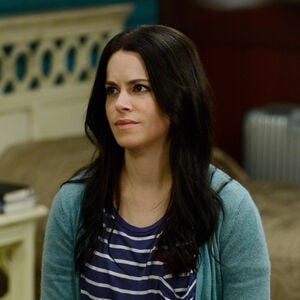Some facts about stories
How do stories relate to our minds and lives?
Hi! I'm Kasra. This is where I share reflections about life, mindfulness, reading, knowledge, and more. If you'd like to receive a biweekly update from me, subscribe here 👇
📚 Reflection: Some facts about stories
1. Our standard for stories is higher than our standard for real life.
Imagine watching a TV show that moved as slowly as real life. A show that allocates camera time to the tedium of eating alone, work meetings, doomscrolling, small talk, trying to fall asleep… all in proportion to the actual time these things take up. It would probably make you claw your eyes out. To spare you this pain, most films and shows gloss over hours, months, and years of monotony in their fictional worlds, skipping to the few moments of action and drama that make life interesting.
This is part of what we love about fiction. I've been watching Netflix's Love, and after about 15 hours of watch time, an entire 8 months of the main characters' romance has passed. That's more than 3000 hours of waking life condensed into a few hours of plot for my viewing pleasure.
Of course, this drastic compression doesn’t make me feel like I'm missing anything about the characters' lives, or that the story is moving too quickly. Nobody wants to invest 3000 hours to figure out whether Mickey and Gus find lasting love. Every moment that's relevant to the story must be squeezed into a few action-packed episodes. All other moments are superfluous.
This expectation of brevity has only heightened over time, and it culminates in our love of TikTok reels that condense decades of life into a single minute:
There are some exceptions to the tendency towards brevity: books and movies that move at the pace of real life, that portray monotony. But it takes skill to do this well. To prevent boredom, the storyteller has to be attuned to the richness of each moment of existence, and capable of putting that richness into words (or scenes). They need to mesmerize the reader with the details of ordinary experience.
The reader also has to be in the right state of mind for this to work. You need to acquire a certain taste to enjoy someone talking about caves for 13 hours. I suspect that acquiring this taste is related to being able to see the beauty in everything, to be engrossed despite the lack of a highlight reel.
Perhaps it's unfair to say that our standard is different between fiction and reality. We'd all love a life as dynamic and exciting as the stories we read—we're just more tolerant of dullness and repetition in real life because we have no choice. Your own life story is the one plot you’re willing to trudge through at a snail’s pace: a day at a time.
If you're not pleased with a show or book, there's an alternative three clicks away; if you're not pleased with your life, you have to create a new one with whatever time and money you have. It's like having exactly one show to watch your whole life, and if you want something else you'd better write, produce, cast, direct, and edit it yourself. But as with the slower-paced books and films, so it is with life: there's always the option of paying closer attention to the existing scene.
2. When we read, we work to create worlds and characters in our head.
I'm currently reading 1984, and the main character Winston repeatedly notices another character who's described as "a dark-haired girl". As I read these passages, I form an image of said dark-haired girl in my mind.
I've also been watching lots of Schitt's Creek at the same time, and there's a girl named Stevie in the show who looks like this:
The dark-haired girl that forms in my head when reading 1984 looks kind of like Stevie. But if I hadn't been watching Schitt's Creek recently, what would the 1984 girl look like in my head?
My guess is that she probably wouldn't have a face at all. The brain doesn't always need a face to form an internal model of a character. The main character is Winston, and when I think about it, I don't have any representation of his face. (But I do have an image of his scrawniness and the ulcer in his ankle that Orwell alludes to.)
How much does the uniqueness of your appearance impact the number of times other people think about you? Say you have one friend who consistently dyes their hair silver. Their silver hair is a distinctive part of your mental image of them. I'm sure that every time you read a story that mentions someone with silver hair, you'll recall your friend. Your brain is lazy and would rather use its preexisting picture of your silver-haired friend than to make one from scratch.
This mental re-creation is what makes books fascinating to me. There's a lot of creative work you have to do as you read. With television and film, all that work is done for you, though it's very expensive for the producers. It's a lot cheaper for the storyteller to say "the plane crashed into the hangar"—and get the reader's billions of neurons to do the work of producing that image—than to actually crash a plane into a hangar and record it with a camera.
I've always found it more energizing to binge on a book than a TV show, and I wonder if this mental creativity is part of that. When I gorge on fast-paced, high-production-value video for hours on end, my brain starts to feel like melted cheese. But when I read a book for hours (which happens rarely, to be fair) I don't feel lethargic at all. Perhaps reading is to the brain what exercise is to the body: despite being more taxing, it leaves you feeling less tired than if you had spent the time more passively.
3. The stories of others encourage us to take a wider view of our own lives.
Reading the stories of others brings me relief because it reminds me of the breadth of human experience, both real and imagined. When consuming an especially captivating novel or film, the problems in your life fade away because you don't have any attention left to think about them. This is one form of relief.
Another form of relief comes from seeing a story as a reflection of your own life, giving you a different perspective on your problems.
I just finished Season 10 of the Great British Bake-Off, and the most captivating aspect of the show wasn’t the bakes or the competition, but the contestants’ varying responses to stress. There were some who put a suffocating level of pressure on themselves and they had trouble handling it. You could see the tension in their facial expressions, their self-talk, and ultimately in their performance.
But there were other characters who maintained their composure, even in the later rounds of the game as the stakes got higher.
I'm closer to Henry than David on this spectrum. I'm sometimes frustrated by the ease with which I get consumed by stress. Watching the stress of the characters on the show was a reminder that this is not unique to me. So many times throughout the season I wanted to give the characters a big hug and tell them they were doing their best and they really were exceptional and it really doesn't matter if you make a mistake. Recognizing this allowed me to apply some of the same sentiments to myself.
All this is easier to appreciate from the outside, third-person view than when you're in the thick of it. Stories are a reminder that there is a bigger world in which all of this is taking place: we don't have to put the whole weight of the universe on the outcome of our own successes and failures.
🧘♀️ Meditation: The universe as a magic trick
In each newsletter, I’ll try to include some writing that sparked joy, wonder, or clearer awareness for me.
On the topic of stories, this is a quote from one of my favorite stories, Sophie’s World:
A lot of people experience the world with the same incredulity as when a magician suddenly pulls a rabbit out of a hat which has just been shown to them empty.
In the case of the rabbit, we know the magician has tricked us. What we would like to know is just how he did it. But when it comes to the world it's somewhat different. We know that the world is not all sleight of hand and deception because here we are in it, we are part of it. Actually, we are the white rabbit being pulled out of the hat. The only difference between us and the white rabbit is that the rabbit does not realize it is taking part in a magic trick. Unlike us. We feel we are part of something mysterious and we would like to know how it all works.
P.S. As far as the white rabbit is concerned, it might be better to compare it with the whole universe. We who live here are microscopic insects existing deep down in the rabbit's fur. But philosophers are always trying to climb up the fine hairs of the fur in order to stare right into the magician's eyes.
All the stories we tell have a well-defined beginning and end, an explanation for what brought them about and what they mean. And they all exist within this One Big Story that we’re part of. We understand bits and pieces of this story: we know that it began with an explosion and it follows certain universal laws. But there’s still so much that we don’t know. We don’t know what created it, why it came about, what the alternative plot lines could have been. And we have no idea if or how it’ll end.
For me, it feels like a stroke of incalculable luck that this story (universe) exists in the first place, and that we get to be part of it. In spite of all our problems, individually and collectively, this story—and all the sub-stories we tell within it—is something to cherish.
See you on the other side,
Kasra
Books read in 2021: 4/40
Writings posted in 2021: 6/40








